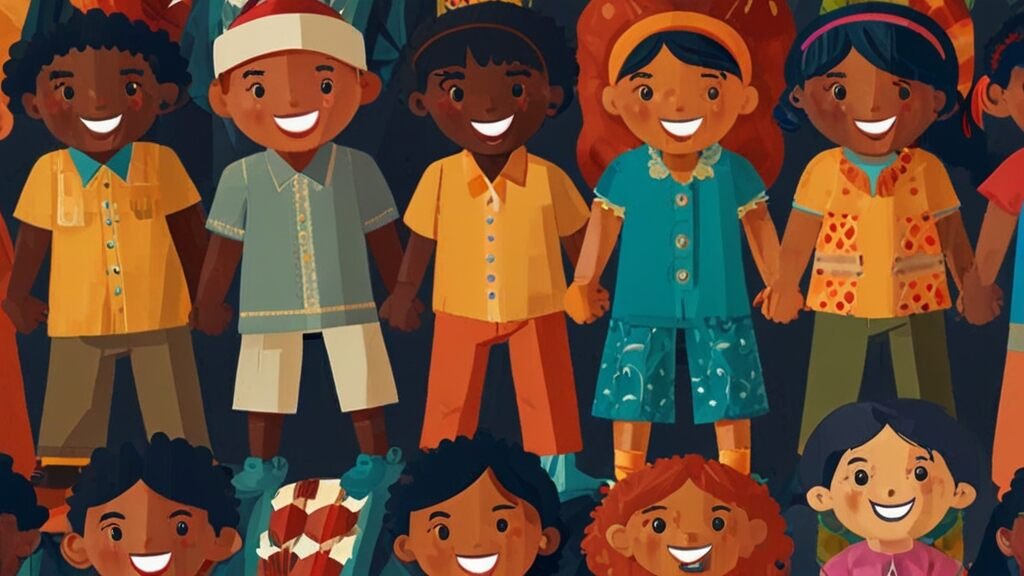Empathy is important. It helps kids grasp how others feel. This skill is key for making friends and succeeding later in life. Teaching empathy to kids changes based on their age and stage of growth.
This piece looks into why empathy matters. It also shares how to teach it. By showing caring, talking about feelings, and doing kind acts, we help kids learn to understand others. This brings out true compassion in them.
Key Takeaways
- Empathy is a crucial skill for children to develop, as it enhances social-emotional skills, relationships, and future success.
- Teaching empathy involves modeling empathetic behavior, discussing emotions openly, engaging in helping activities, and praising empathetic actions.
- Age-specific strategies, such as describing emotions, reading stories, and teaching healthy boundaries, can further develop empathy as children grow.
- Empathy education should take place both at home and at school, with a focus on nurturing children’s “inner heroes” and inspiring them to stand up for others.
- By fostering empathy, we can empower the next generation to be caring, compassionate, and committed to making a positive difference in the world.
What is Empathy and Why is it Important?
Empathy means you understand and feel what others do. It lets you think about their feelings and what it’s like to be them. This skill is about knowing we are unique, realizing others can feel and think differently, and seeing things from their view.
Being empathetic is crucial for good friendships and relationships. It cuts down on fights and misunderstandings. Plus, it encourages supportive actions, kindness, and helps in achieving more in life.
Empathy: The Ability to Understand and Share Feelings of Others
Studies have found that kids who are more empathetic do better socially. They have stronger bonds with others and perform well in school and beyond. Understanding and sharing others’ emotions makes our connections deeper and our community stronger.
The Benefits of Empathy in Friendships, Relationships, and Life Success
When people work on being more empathetic, they improve their relationships and social life. This brings about tighter friendships, more meaningful relationships, and chances for success in life. Empathy is key to enhancing all areas of life.
General Strategies to Teach Empathy at Any Age
Teaching kids empathy is vital for their emotional growth. Both parents and teachers can use various methods to accomplish this. Showing empathy ourselves is key. This includes caring for others, even when we’re upset, or in discipline situations. By acting empathetic, we show the next generation how it’s done.
Diving into their feelings with kids is just as important. We shouldn’t ignore or hide their feelings. Instead, we should help them name their feelings and understand others too. This grows their ability to understand and share feelings.
Doing things to help others is big for building kind kids. They can help at home, in the neighborhood, or even globally. When they see how they help, they learn the power of being caring.
And don’t forget to celebrate acts of empathy. Praising when kids show they care encourages more of the same. This can deepen their understanding of why it’s important to be kind and thoughtful.
Age-Specific Strategies for Developing Empathy
To teach children empathy, we must use methods that fit their age. For kids aged 3-5, we can start by helping them name emotions. Also, reading stories and talking about how characters feel boosts empathy. Kids this age benefit a lot from play. For instance, having a “We Care Center” can encourage nice gestures.
Ages 3-5: Describing and Labeling Emotions
Kids at this stage are learning to recognize their feelings. Teaching them words for emotions, like happy or sad, is a great first step. Fun games like “emotion charades” can help them understand these feelings in others too.
Ages 3-5: Reading Stories and Discussing Character Feelings
Stories play a key role in teaching empathy. Reading books with simple emotions and discussing them helps kids relate to others. Asking how a character feels or if they’ve felt that way helps them learn to think from other’s points of view.
Ages 3-5: Creating a “We Care Center”
Setting up a “We Care Center” where kids can play and learn about caring is a good idea. Fill it with toys and books that teach kindness. This can help make caring for others a natural part of their day.
Ages 3-5: Coaching Social Skills in the Moment
Guidance is crucial when young kids have social troubles. Providing advice like suggesting kind words or showing how to invite others to play helps. This instant support boosts their social and emotional skills.
Ages 5-7: Playing Emotion Charades
For kids aged 5-7, interactive games are effective. Playing emotion charades improves their empathy. They learn to see situations from someone else’s eyes by acting out feelings for others to guess.
Ages 5-7: Using Pictures to Identify Emotions
Show your child pictures of faces showing different emotions. Then, ask them to guess what the people feel. This game helps them learn to read emotions and understand how others feel based on their expressions.
Ages 5-7: Embracing Diversity
To help kids value others, show them different cultures and experiences. Reading diverse books, watching films, and doing activities that celebrate differences is a good start. This promotes empathy and a sense of inclusion.
Ages 5-7: Observing Others’ Nonverbal Cues
Around ages 5-7, children can start noticing how people show their feelings without words. They learn about body language and tone of voice. Talking about what these signs mean can deepen their understanding of how others feel.
Ages 5-7: Teaching Healthy Boundaries
It’s vital to teach kids about personal space and respecting others’ feelings. Use roleplay and discussions to teach these lessons. This helps develop empathy while showing kids how to keep their own space safe.
How to Teach Children Understanding?
To help children learn understanding, focusing on a strong moral identity is key. A study showed kids who heard they were helpful were more generous later. This means teaching strong morals helps kids be kind more often.
Giving Kids “Do-Overs” for Empathetic Learning
Letting kids have “do-overs” when they’re not kind is a smart idea. It helps them grow their empathy and respond better. Kids learn to think about how their actions affect others. This makes them more likely to be considerate.
Encouraging Empathy Through Stories and Movies
Using stories, plays, and films to promote perspective-taking can boost kids’ empathy skills. When children think about how characters feel, they learn about feelings. This helps them become more understanding and caring.
Empathy Education at School and at Home
Empathy education is important in both homes and schools. Many schools are doing great things to teach kids about empathy. They’re using programs like “kindness boards” and the Jigsaw model. These help students be kinder and understand each other better.
Supporting Empathy Programs in Schools
These programs at schools are super helpful. They give students chances to practice being kind. By showing kindness is cool, kids learn to help each other and see things from others’ viewpoints.
Examining Family Values and Priorities
Parents, looking at family values offers kids strong messages on kindness. Not just about doing well in school. Being a role model for empathy and talking about understanding others deeply impacts a child’s growth.
Mindful Use of Social Media
On social media, parents should keep an eye out. Too much time online can keep kids from learning real-life empathy. It’s important to balance tech time and help them make real connections. This builds people skills for happy relationships.
Nurturing Children’s Inner Heroes

It’s important to teach kids about empathy. We should also help them find their inner heroes. This includes bravery and the choice to support others. Adults can lead by example, showing how to stand up to bullies and protect those in need. Demonstrating moral courage against injustices inspires children. It motivates them to want to be activits and contribute positively.
Teaching Effective Responses to Bullying
Adults can show bravery to children. But, they should also teach kids how to help in bullying cases. Kids can learn to intervene safely and help their friends. By teaching these anti-bullying techniques, children learn to be proactive in stopping bullying.
Inspiring Stories of Heroic Kids
Telling inspiring stories of heroic kids who stood up for others can greatly motivate children. These stories show that even at a young age, someone can change the world. Listening to real-life stories of their peers can inspire kids. It empowers them to find their own inner heroes and fight for what’s right.
These efforts in nurturing “inner heroes” can make a big difference. They help the next generation grow up caring, kind, and eager to help the world.
Conclusion
Teaching children empathy is key for their growth and success. By showing how to be empathetic, talking about feelings openly, and doing things to help others, we pave the way for empathy. It is also about giving children age-specific lessons, like talking about emotions and setting healthy limits, as they get older.
In the end, fostering empathy and encouraging children’s inner heroes are essential. This helps them be caring, understanding, and eager to make the world better. The conclusion underlines the need to teach empathy for kids to do well in life and their connections with others.
By focusing on empathy, we set kids on a path to be emotionally smart and morally strong. This approach helps build a kinder and fairer society. This part aims to highlight the main points and inspire action for supporting empathy development in children.
FAQ
What is empathy and why is it important?
Empathy is understanding others’ feelings and putting yourself in their shoes. It’s vital for good friendships and relationships. By reducing conflicts and promoting kindness, empathy helps us succeed in life.
How can parents and educators teach empathy to children?
To teach empathy, adults should show it and talk about feelings. They can also involve kids in helping out and praise them when they’re kind. It’s important to adjust these lessons based on the child’s age.
What age-specific strategies can be used to develop empathy in children?
For kids aged 3-5, it’s good to talk about how people feel and have a special area for caring. Kids this age can also learn empathy by watching others interact.
Kids aged 5-7 can learn through games like emotion charades and by talking about different feelings. It’s also good to show them how to respect personal space.
How can parents and educators help children develop a moral identity and nurture their “inner heroes”?
Studies have shown that praising kids when they help makes them more giving later on. Giving kids second chances to act better can also improve their empathy. Encouraging them to think about others’ feelings through stories and plays is very powerful.
Parents and teachers can lead by example, standing up against bullying and telling stories of brave kids to inspire their moral courage.
What is the role of schools and families in teaching empathy?
Schools can use special activities to teach empathy, like a kindness board. They can also model kind behavior and encourage caring.
At home, parents should teach family values that focus on empathy, not just on achievements. They must watch their kids’ online activities to make sure they learn empathy from real-life interactions.





